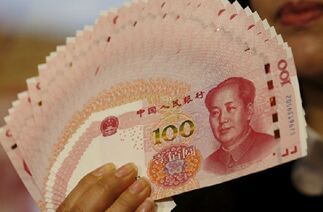人民币贬值能缓解贸易战冲击,但也有代价
|
China has a simple weapon it can use to try and foil President Trump’s tariffs.
Will it work? The value of China’s currency, the renminbi, has fallen over 7 percent against the dollar since mid-April, an unusually large move. A lower renminbi makes China’s exports cheaper to foreign buyers, which is particularly helpful right now when Mr. Trump’s tariffs are making many Chinese goods more expensive in the United States market. And since China’s government manages the value of its currency, the decline certainly has its blessing. Mr. Trump in a tweet last week said the weakness of the renminbi was eroding the United States’ competitive edge. The Chinese authorities have said they are not deliberately weakening the value of the renminbi to gain an advantage in the trade conflict. And some of the recent decline in the currency may have been driven by economic factors unrelated to trade. But the renminbi does not trade freely. Its price must each day rise or fall within a strict range set by the central bank. That range has been steadily lowered. The recent slide, which took the renminbi back to last year’s levels, began as the trade-war rhetoric was heating up. While a weakening currency can soften economic blows, it also comes with costs. When China devalued its currency three years ago, fear spread through the country’s economy and markets around the world. But for China, letting the renminbi slide may have advantages over other responses to American tariffs. Since China exports far more to the United States than it imports, it cannot respond with tariffs on anywhere near the same amount of American products. Devaluations carry a legion of risks, though. First, it’s not clear the extent to which China might need to let its currency weaken. The decline of the past three months has potentially benefited all of China’s exports to the United States, which last year totaled over $500 billion, and partially offset the impact of the tariffs imposed so far. The United States’ first tariffs on $34 billion of Chinese goods, which took effect this month, are set at 25 percent. Other tariffs proposed by Mr. Trump, on a larger value of goods, would be set much lower at 10 percent. But Chinese policymakers would likely want to avoid a situation in which investors and others believed the level of the currency was directly affected by developments in the trade war. And a big slide could hurt China. A nose-dive in the renminbi would come at a difficult time for the Chinese economy. A dizzying rise in borrowing has driven a considerable portion of China’s growth. The government, fearing that some borrowers will have problems repaying the debt, has tried to restrain borrowing. But such limits can also slow the economy, which is why some constraints were recently loosened. Fears about China’s debts were on the rise in 2015 when the government carried out a surprise devaluation. Individuals and companies in China dumped renminbi and bought other currencies, to protect their wealth against further decreases in the value of the Chinese currency. The selling, known as capital flight, suggested that the Chinese had little faith in their own economy, and raised questions about the Chinese central bank’s handling of the devaluation. The other big fear at the time was that the prices of Chinese goods in other countries would fall, forcing producers there to also cut their prices and hurt the wider economy in the process. China imposed new “capital controls” that stanched the capital flight, and a pick up in the global economy and prices alleviated the concern about cheaper Chinese goods. The added controls and the fact that the global economy is in somewhat better health may allow China to do another devaluation without creating as many jitters. But it would still be a hard task to carry out, in part because individuals and firms find ways around the rules. “Carrying out a controlled depreciation is one of the most difficult maneuvers a central bank can pull off,” said Brad Setser, a senior fellow at the Council on Foreign Relations. “China, through using capital controls and its reserves, could pull it off again, but there is a risk that a weaker currency is taken as evidence that China can’t assure financial stability.” And the factors that perhaps slowed the selling of the renminbi no longer exist. Robin Brooks, the chief economist at the Institute of International Finance, notes that the dollar weakened substantially in 2017, which, he says, helped stabilize the value of the renminbi. “If the dollar picks up again, it is an open question how well capital account restrictions will work to stem the potential capital flight,” Mr. Brooks wrote in an email. |









